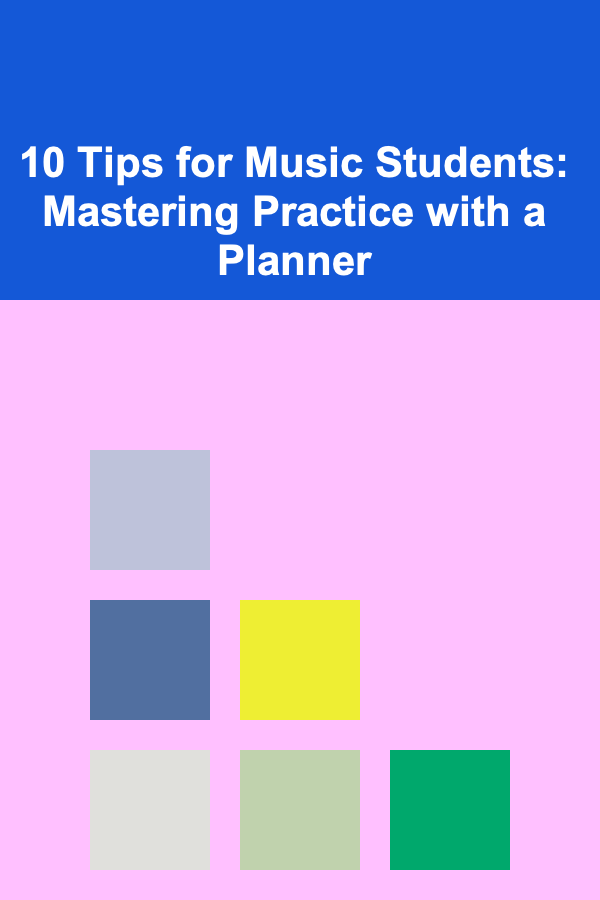
10 Tips for Music Students: Mastering Practice with a Planner
ebook include PDF & Audio bundle (Micro Guide)
$12.99$9.99
Limited Time Offer! Order within the next:

Learning music is an enriching and rewarding experience that requires consistent practice and dedication. Whether you're a beginner or an advanced musician, having a structured and effective practice routine is key to achieving progress. One of the most powerful tools in this pursuit is a planner, which can help you stay organized, set goals, and track your progress.
In this article, we will explore how music students can leverage a planner to master their practice routines. We will offer ten actionable tips for integrating planning into your music practice, ensuring that each practice session is purposeful, efficient, and productive.
Set Clear, Achievable Goals
A planner is not just a tool for scheduling; it's also a way to define what you aim to achieve. One of the first steps in maximizing your practice is setting clear and realistic goals. Without specific targets, your practice sessions can become aimless, leading to frustration and stagnation.
How to Set Effective Goals:
- Break down long-term goals: If your ultimate goal is to master a piece or improve your technique, break it down into smaller, manageable milestones. For instance, mastering a complicated piano piece could be broken down into learning one measure at a time.
- Be specific: Vague goals like "get better at guitar" are not helpful. Instead, aim for something like, "Learn and practice the C major scale daily" or "Play the first 16 bars of the song fluently."
- Track your progress: Include space in your planner to note achievements and progress towards your goals. This will help you stay motivated and see the tangible improvements you're making.
By breaking large goals into smaller, attainable ones, you can keep your focus on incremental progress and stay motivated throughout your music journey.
Create a Weekly Practice Schedule
Consistency is key in music practice. A planner helps you create a consistent weekly schedule, ensuring that you dedicate regular time to practice, even on busy days.
How to Design a Weekly Schedule:
- Choose fixed times: Block out regular practice times in your planner each week. Treat these as non-negotiable appointments with yourself. For example, "Practice from 4:00 PM to 5:00 PM every weekday."
- Balance different skills: Ensure that you allocate time to various aspects of your music studies, such as technique, repertoire, ear training, and sight-reading. This will help you become a well-rounded musician.
- Prioritize practice time: If you know you have a busy week ahead, plan to practice during the most productive times of your day. Make sure that practice doesn't get squeezed out by other less important activities.
Having a fixed practice schedule helps you stay disciplined and makes it easier to establish a routine. This consistency is essential for making steady progress as a music student.
Break Your Practice Sessions Into Focused Blocks
Instead of practicing for long, uninterrupted stretches, consider breaking your practice sessions into shorter, focused blocks of time. Research has shown that focusing on one skill at a time for short periods is more effective than trying to practice everything at once.
How to Use Focused Practice Blocks:
- Use the Pomodoro Technique: This involves practicing in 25-minute blocks, followed by a 5-minute break. After four blocks, take a longer break of 15-30 minutes.
- Focus on one skill per block: For example, during one block, focus on scales; during the next, focus on your piece's dynamics. This allows you to dive deeper into each element without feeling overwhelmed.
- Record your focus areas: In your planner, write down what you intend to work on during each block. This keeps you on track and ensures you don't waste time deciding what to practice.
By breaking up your practice into focused blocks, you can maintain higher levels of concentration and make faster progress without experiencing burnout.
Keep Track of Challenges and Areas for Improvement
A key advantage of using a planner for music practice is that it helps you identify areas of difficulty. When you encounter challenges, whether it's a tricky section of a song or a particular technique, noting them in your planner helps you address these issues systematically.
How to Track Challenges:
- Document specific problems: If a passage in a piece is difficult, write it down in your planner. You could write something like, "Trouble with the rhythm in the second measure of the chorus."
- Note practice strategies: Next to the problem, write down specific strategies to solve it, such as "Slow practice," "Use a metronome," or "Isolate hand movements."
- Monitor improvement: As you continue to practice, use your planner to track improvements. Seeing progress on paper will motivate you to keep going.
Tracking your difficulties allows you to approach your practice with a problem-solving mindset and ensures that you're addressing areas that need the most attention.
Include Performance Goals and Review Sessions
Performance anxiety and nerves can be a significant hurdle for many musicians. Planning regular review sessions and mock performances in your planner will help build confidence and ensure that you're ready when it's time to perform in front of others.
How to Prepare for Performances:
- Schedule review sessions: Set aside time in your planner for weekly or biweekly review sessions where you perform your piece from start to finish, just as you would in front of an audience.
- Create mock performances: Use your planner to schedule mock performances for friends or family members. These "dress rehearsals" simulate the pressure of a real performance and allow you to address any issues with nerves or presentation.
- Set performance goals: Whether you're preparing for a recital or an audition, your planner can help you set performance-specific goals. For example, "Perform my piece without stopping" or "Maintain a steady tempo throughout the performance."
By practicing performance under "real" conditions, you can alleviate nerves and build the skills necessary for stage success.
Integrate Theory and Ear Training
While playing an instrument is often the most exciting part of being a music student, theory and ear training are equally essential. A planner can help you dedicate time to these less "hands-on" but incredibly important areas of your musical development.
How to Plan for Theory and Ear Training:
- Schedule regular theory sessions: Set aside time in your planner for studying music theory, such as scales, chords, harmony, and rhythm. Treat these as important practice sessions, just like playing your instrument.
- Incorporate ear training: Dedicate a portion of your practice time to ear training exercises, such as identifying intervals, transcribing melodies, or practicing solfège.
- Track theory progress: Use your planner to record what theory concepts you've studied and track your understanding. For example, note when you've mastered intervals or can identify chord progressions by ear.
Theory and ear training are crucial components of becoming a well-rounded musician. Incorporating them into your practice routine ensures that you're developing a full spectrum of musical skills.
Celebrate Small Wins and Stay Motivated
Practicing music can sometimes feel like a slow process, especially when you're working on a complex piece or trying to improve your technique. A planner is a great tool for tracking small wins and celebrating progress, which helps maintain motivation over time.
How to Celebrate Progress:
- Mark milestones: In your planner, highlight key achievements, whether it's mastering a section of a piece or completing a challenging practice session.
- Reward yourself: After completing a difficult goal, treat yourself to something you enjoy. This could be a break, a favorite snack, or a fun activity.
- Visualize progress: Looking back at the notes in your planner can show you how far you've come, which can be incredibly motivating, especially when facing a tough challenge.
Celebrating small wins keeps your spirits high and reminds you that your efforts are paying off. Music is a journey, and acknowledging progress along the way makes it more rewarding.
Use Your Planner for Motivation and Inspiration
A planner can also serve as a source of inspiration when you're feeling unmotivated or stuck. You can use your planner to jot down your long-term musical dreams, favorite musicians, or upcoming performances, helping to reignite your passion for music.
How to Stay Inspired:
- Create a motivational section: Include quotes, images, or reminders of why you love music in your planner. For example, paste a picture of your favorite musician or write a quote that inspires you.
- List musical goals: If you're unsure of what to focus on next, write down long-term goals or pieces you'd like to learn. This can give you direction and purpose during your practice sessions.
Having a source of inspiration readily available can help you push through difficult days and keep your love for music alive.
Analyze Your Practice Sessions
After each practice session, take a few minutes to reflect on what worked well and what could be improved. Writing down your thoughts in your planner helps you make the most of each session and prepares you for the next one.
How to Analyze Your Sessions:
- Note what went well: Celebrate the moments when you felt good about your practice, whether you achieved a breakthrough or simply played a piece better than before.
- Identify areas for improvement: Reflect on the challenges you faced and write down strategies for overcoming them next time.
- Track patterns: Over time, you'll begin to notice patterns in your practice, such as what times of day you practice best or what types of pieces are more challenging. This insight helps you optimize your practice routine.
Reflecting on your practice sessions ensures that each one becomes a learning opportunity, making your practice more effective over time.
Stay Flexible and Adapt to Changes
While consistency is key, life can sometimes get in the way of your practice routine. Having a planner means you can adapt and adjust when needed, ensuring that you stay on track even when things don't go as planned.
How to Stay Flexible:
- Adjust goals if needed: If you find that you're struggling with a particular aspect of your practice, don't be afraid to adjust your goals. The process of learning music is dynamic, and your goals can evolve as you progress.
- Change your schedule: If you miss a practice session, adjust your schedule to make up for it. Flexibility ensures that you don't fall behind or feel discouraged.
- Embrace growth: Be open to new methods of practice or different musical styles. As your musical journey evolves, so should your planner.
Remaining flexible and adaptable will help you stay on track and keep your practice routine enjoyable and sustainable.
Conclusion
Mastering music requires time, effort, and a structured approach. By using a planner to organize your practice sessions, set goals, and track progress, you can create a practice routine that is purposeful, efficient, and motivating. With the tips outlined in this article, music students can take control of their learning, stay focused on their goals, and see tangible results in their musical development. The key is consistency, dedication, and making the most of every practice session with the help of a well-organized planner.
Reading More From Our Other Websites
- [Toy Making Tip 101] From Scrap to Play: Turning Everyday Materials into Handmade Toys
- [Paragliding Tip 101] Safety First: Leveraging GPS Alerts for Emergency Landings in Paragliding
- [Survival Kit 101] Disaster Preparedness: Essential Steps to Keep Your Family Safe
- [Personal Investment 101] How to Take Advantage of Employer Stock Purchase Plans
- [Personal Care Tips 101] How to Know When Your Acne Treatment Cream Needs to Be Replaced
- [Personal Care Tips 101] How to Apply Hand Cream to Achieve Smooth, Youthful Hands
- [Home Holiday Decoration 101] How to Create a Festive Holiday Tablescape for Dinner Parties
- [Scrapbooking Tip 101] Step-by-Step Guide: Building a Vintage-Style Scrapbook Album
- [Organization Tip 101] How to Store Long-Handled Tools Safely
- [Personal Care Tips 101] How to Keep Your Body Lotion Fresh and Effective

How to Create a Magical Holiday Scene with DIY Snow and Frost Decor
Read More
How to Integrate Renewable Energy with Smart Home Systems
Read More
How to Organize Your Email Inbox for Efficiency
Read More
How to Set Up a Craft Challenge to Use Your Supplies
Read More
How to Set Up Regular Check-ins with Your Team
Read More
Tips for Reducing Water Usage: Eco-Friendly Practices for Every Household
Read MoreOther Products

How to Create a Magical Holiday Scene with DIY Snow and Frost Decor
Read More
How to Integrate Renewable Energy with Smart Home Systems
Read More
How to Organize Your Email Inbox for Efficiency
Read More
How to Set Up a Craft Challenge to Use Your Supplies
Read More
How to Set Up Regular Check-ins with Your Team
Read More